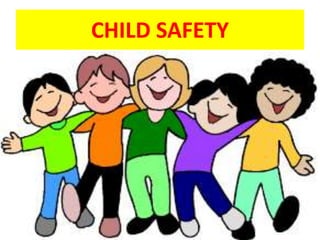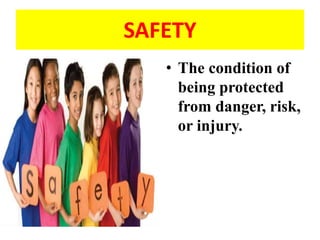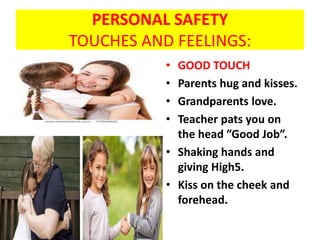Child safety
- 1. CHILD SAFETY
- 2. CHILD • a person of 14 years and under.
- 3. SAFETY • The condition of being protected from danger, risk, or injury.
- 4. HOME SAFETY • Never stick your fingers or any object into an electrical outlet or light bulb socket. • Never use any electrical appliance if you are wet.
- 5. HOME SAFETY • Do not cook in the absence of your mother or elders at home.
- 6. ROAD SAFETY • You should not cross the street walking between parked vehicles. • You should always cross the street walking through pedestrian crossing .
- 7. PERSONAL SAFETY • You should know your complete home address, telephone number and parents' first and last name.
- 8. PERSONAL SAFETY • You should not reveal any personal information about yourself and your family over the phone to a stranger.
- 9. PERSONAL SAFETY • You should not open the door until you know the identity of the person.
- 10. PERSONAL SAFETY • You should not play in isolated areas of parks and playgrounds.
- 11. PERSONAL SAFETY • The "buddy" system should be used to enter public restrooms.
- 12. PERSONAL SAFETY • Never accept any gifts from a stranger.
- 13. PERSONAL SAFETY • If you are being bothered or followed. • Choose a safe location. • A safe location can be a school, library, police station, store, or neighbour's house, anywhere you can find lots of people.
- 14. PERSONAL SAFETY • If there is no safe place for to receive help, then run away as fast as possible, screaming for help to attract as much attention as possible.
- 15. PERSONAL SAFETY TOUCHES AND FEELINGS: • GOOD TOUCH • Parents hug and kisses. • Grandparents love. • Teacher pats you on the head ”Good Job”. • Shaking hands and giving High5. • Kiss on the cheek and forehead.
- 16. PERSONAL SAFETY TOUCHES AND FEELINGS: BAD TOUCH • Hitting, slapping, punching. • Kissing on the mouth. • Makes you feel scared/nervous/ ashamed. • Told to keep it a secret. • Touching areas covered by a swim suit.
- 17. PERSONAL SAFETY
- 18. PERSONAL SAFETY • Never hide anything from your parents. • Always share your feelings, fear and concerns with them.
- 19. PERSONAL SAFETY • Ask your parents to • Download the free Red Cross First Aid App so you will have instant access to expert advice for everyday emergencies. • Download the Red Cross Emergency App -This app gives real-time safety information.





















